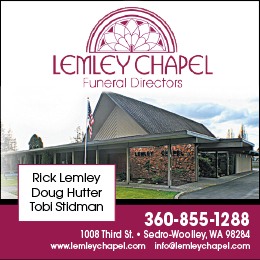A warm place to sleep: Concrete church aims to open overnight shelter for homeless people
At well over 100 years old, Mount Baker Presbyterian Church is the oldest building in Concrete. And if its leadership team and outside partners manage to chart its course successfully, it could become the town’s first overnight shelter.
The idea for the overnight shelter grew from the church’s membership and leadership, said Pastor Kevin Riley.
“The church decided to do it because it’s what churches do,” said Riley. “We recognized there was a need … and we saw this as a way to concentrate on ‘the least of these’ in our community, and our Matthew 25 vision.”
In Matthew 25 of the Christian Bible, known popularly as the “sheep and the goats” passage, Jesus describes people who claim to be righteous, and their actions (or inaction) toward people who are hungry, thirsty, strangers, naked, sick, or imprisoned. Those who minister to the hungry, thirsty, etc., are the “sheep” and “inherit the kingdom.” But those who don’t are “goats” and are cursed into everlasting fire. “Inasmuch as you did (or didn’t) do it to one of the least of these … you did it to Me,” says Jesus.
Struggle to shelter
Efforts to create an overnight shelter in Concrete have met with less than stellar results. A hurry-up shelter in the town’s fire hall last winter drew zero users. And Riley’s initial conversations with potential partners last year also ended with no plan in place.
Enter Welcome Home Skagit, a fledgling nonprofit dedicated in part to serving the homeless community. Welcome Home grew from the Mount Vernon Seventh-day Adventist Church, where a group of likeminded people began meeting, working at the Friendship House shelter, and eventually forming the 501(c)(3) in February 2019. The Concrete overnight shelter would be the first shelter for which Welcome Home Skagit is sole manager.
“This is our first on our own,” said Welcome Home Skagit President Larry Paise. “But given we are using the established patterns from the experiences and lessons learned from [Friendship House in] Mount Vernon, it’s not a novel experience for the county.”
Funded by the county to the tune of $100,000 for its first year, Welcome Home Skagit plans to serve as the overnight shelter’s management. The county approved the contract with Welcome Home Skagit on Jan. 27.
“We have a lot of requirements for any entity that we contract with; they have to prove they can do what they’re saying they can do,” said Sarah Hinman, division manager for Housing & Community Services at Skagit County Public Health. “We were familiar with them; we’ve been working with them for a couple years.”
The proposed shelter would open on Feb. 15 for a four-week trial period. Here’s how it would operate:
- Hours of operation: 7 p.m. to 8 a.m. daily, with a late start on Mondays and Tuesdays.
- Signup (or “intake”) would occur every day on a space-available basis, at Concrete Community Center (see schedule, p. 29).
- Entry is “low-barrier,” but mandatory criminal history checks would be run on all applicants.
- No minors (under 18) allowed; hotel vouchers are available through Community Action (the Resource Center) for families with children.
Guests would be given a clean bed, a blanket, and a pillow every night. The shelter would have a minimum of two staff members on duty at all times. Staff would remain awake throughout the night. Random security checks would be made inside and outside the church.
All in favor?
At a Jan. 22 community meeting at the church, the three partnering entities answered questions from about 50 attendees. Feedback was mostly positive, although one woman described her negative experiences with homeless people who use illegal drugs and said, “Not one of them is nice. They don’t deserve” a shelter.
Another woman pushed back. “I think there’s a false perception that because you’re homeless, you’re bad or more dangerous than the community at large. I have stood across the counter from many homeless people, and I don’t feel more threatened by someone who is inadequately housed. Homeless does not equal dangerous. I see that fear, and it’s false.”
“We as a church truly feel that we’ve been called to do this,” said Riley. “We feel we’ve been called to be a light in the darkness for those who are suffering, and to help create pathways out of their darkness. We take Matthew 25 quite literally, so we want to search out and become a community for the ones who are usually forgotten,” said Riley.
For more information about the proposed overnight shelter in Concrete, go to www.welcomehomeskagit.com/concrete-project.
—J. K. M.
[SIDEBAR]
Public comment and public hearing
Mount Baker Presbyterian Church has applied to Town of Concrete for a temporary (six-month) conditional use permit, which will allow the church to host the overnight shelter in a residential zone. The application and materials submitted by the church are available at Town Hall.
Written comments regarding the permit application may be submitted no later than 4:30 p.m. on Feb. 7 to town planner Marianne Manville-Ailles at P.O. Box 39, Concrete, WA 98237 or [email protected]. Comments also may be faxed to 360.853.8002.
A public hearing for verbal and written comments will be held during the regular Concrete Town Council meeting on Feb. 10 at 6 p.m., at Concrete Town Hall, located at 45672 Main St. in Concrete.
Anyone may request a copy of the council’s decision by calling Town Hall at 360.853.8401.
Q&A session from Jan. 22 community meeting
(edited for length)
Q: What if there’s loitering?
A: Tell us if it’s a problem. If there’s anything that’s happening near the property that you haven’t noticed before, please contact us;we want to work with you. We think we have a plan for minimizing impacts around the church.
Q: Will there be an increase in deputy presence during the hours of operation?
A: Not that I’m aware of. All of the people that we plan to pre-clear, I would classify as homeless. We will accept law enforcement drop-offs,such as a domestic violence situation—IF we have space available. We plan to work with law enforcement to recognize that potential hazard. But we expect that to be the exception.
Q: The shelter on College Way had a full-time security guard. Is that true? Will this shelter have a security guard?
A: The security guard was one of two people on duty. Our experience was that the people who were hired as security … didn’t always provide the level of service we were hoping for. In order to balance what we were trying to do as well as provide the right level of service, we decided we were going to have 2 people on staff at all times, and that one of those people would be responsible for the security function, which is largely making sure property is secure, and fire watch duties. The hired security firm fell short in that they often didn’t want to interact with the guests, and when they did,they didn’t always interact well.
Q: How do you source your volunteers?
A: Go to the Web site (www.welcomehomeskagit.com); there’s a“Join Us” button to get involved. All volunteers have to pass criminal background checks. Interview.
Q: The church will be locked down, correct?
A: Yes. We recognize that response times could be extended. We’ve talked a lot about law enforcement response and EMS responses. Staff will be instructed to take precautions.
Q: A man in Anacortes was wanted for murder, and in a shelter there.
A: We do the WSP check, but I don’t think that includes warrants. They’ll have to provide us with name, birthdate … and we request IDs.Not every person will have an ID, but they do have to supply us with information sufficient to allow us to run background checks. Typically, someone wanted fora serious crime will trip the background check.
Q: Is there a plan going forward to make sure you have staff trained in crisis management, first aid?
A: Yes. There will be at least one person on duty who will have had first aid, CPR, and AED training. We’re arranging those classes now.We’re renting an AED because there’s not one in the church. Narcan training too,with Narcan on site in a lock box. We’ll also be doing some de-escalation and sensitivity training.
Q: This is strictly a shelter for the homeless, not an emergency shelter?
A: It’s considered a temporary overnight shelter for the winter season. The church would open its doors during a catastrophic emergency.
Q: There are 4 buildings in town that can accommodate 12people overnight: The CCC and the other churches. Have they offered to help?
A: They haven’t offered, but they haven’t been asked either. Other churches?Every church is called in a different way. Those other churches are doing remarkable things in their way. We have been called in this way.
Q: Plans for showers? Maybe the pilots lounge showers could be used?
A: Showers are “down the road” (a future amenity). I want to do this on a temporary basis. Let’s assess the need—see how many people show up. Let’s assess the impact on the community. If it has a detrimental effect on the community, we’re not going to want to continue to do it.
Q: What’s the plan or contingency for what happens if something goes sideways, not according to plan?
A: All of our people who will be in direct contact with the users, all have several years’ experience of working in the Mt. Vernon shelter.They have a lot of experience working with people in tension-filled situations.Our need to rely on law enforcement is relatively low, but that can happen.When it does, that’s why we have a minimum of 2 staff members on duty always,sometimes 3. Other guests tend to rally around the staff (if something goes sideways). It’s never a perfect situation, but it is the best we can do if law enforcement arrives. We’ve never had any injuries during a confrontation.Generally what ends up happening is someone will blow up and then storm out. We notify law enforcement when someone leaves the shelter, we lock down and notify law enforcement.
Q: How many homeless people have you counted up here?
A: We’ve commonly been asked, what’s the real need? Do we know? We know there have been surveys done over time, and the real answer is we’re not sure. But given where we’re starting, I don’t know if we’ll fill the12 beds on day one, or if we’ll only have a few … but we have to try. But talking to deputies, we know that there’s a need, that people are sheltering in cars. Whether people will come is another question.
Deputy Esskew: More than 12.
A: We would establish a waiting list. Once we have 12, they’ll be able to come and have a bed. If they don’t come 2 nights in a row, they’ll lose their bed and we’ll fill that bed with someone from the waiting list. We try to provide that certainty—give them certainty and control—and that also gives us the opportunity to create a relationship with them, to try and start that journey to move them forward. This is focused on a cold weather shelter. If this is successful, we’ll be back, talking about starting earlier in the winter season.
Q: Why open a shelter? Why instead just help them where they’re at?
A: I can’t count the numbers of homeless. Some people have full-time jobs, but they can’t afford a place to live. A 1-bedroom apartment in Skagit County is $1,200/month.
A: A temporary shelter is one small part of the plan, part of the system. You need a shelter, transitional house, and affordable housing.The county has to work with the state to solve the problem. The people we’re seeking to serve are already here; you have to meet them where they’re at. If there was low-income housing in place, and jobs, we’d work at that level. But we have to start where they’re at: helping them be dry and warm, and connecting them to social services.
Q: I don’t want to see the pedophile list grow. I don’t want them brought to the town, or problems. How will you vet these people so that we don’t have to worry about our safety?
A: A WSP criminal history check. If they’re on the registry, they’re not allowed.
Q: Community Action is closed on the weekend. Does that mean people will have to be cleared before the weekend?
A: We’re arranging use of a room there to do check-ins as part of our agreement with the county and Community Action.
Q: What about teens?
A: Oasis Teen Shelter for under 18.
A: If families need winter shelter, there are voucher programs available through Community Action. But this shelter would be no minors under 18.
Q: Will they be allowed to park their vehicles in the Concrete Community Center parking lot?
A: The rules are they are to disperse in the mornings; they are not to remain there during the day.
Deputy Esskew: They should give you vehicle IDs.
A: That’s a good idea—issue a permit.
Q: Communicable diseases: Is that an issue, and how is it handled?
A: It can be. There are policies and procedures in place to deal with that. We’re on the lookout for it. Bedbugs, lice, scabies, colds, flus … we’re on the lookout. For example: cold and flu symptoms: If 2 or more are exhibiting symptoms, staff is to isolate those individuals to the extent they can, and notify shelter management. If it goes beyond that, we’ll work with county health to make decisions about whether the shelter continues, EMS notified, additional cleaning and sanitation procedures. Exclusion as necessary. Flu shots, Hep A shots, etc. At the Mt. Vernon shelter we’ve also worked with Skagit Regional Health doctor residency programs, who have done clinics at the shelter. We try to connect health care professionals with people.
Q: Policies and procedures?
A: Link on back of handout for policies and procedures.
Q: Not everyone has issues, but there are a lot of people who need psychological help. Will there be people on site to evaluate, for safety purposes?
A: It’s all a matter of degree. There are a number of people in the impacted community who have mental health issues, but it is a matter of degree.We interact with them frequently. Our guidelines: Do they represent a danger to themselves or others? Are they hostile? Are they belligerent? Do they exhibit behaviors that would make us believe that they might harm themselves or a guest? Most of our staff have years of practical experience of dealing with homeless people, a pretty good history. With anyone who has less experience, they’ll be paired with an experienced staff member.
A: It would be an adult facility. No minors. If a minor or a family presents itself, we have through Community Action or Skagit County Sheriff’s Office, voucher programs that will direct them somewhere else.
Q: Any prioritizations? What’s the focus? Families?
A: People who are living in unsheltered conditions or in their car.
Q: Plans for expansion?
A: We’d need a bigger building.
Q: Pets?
A: We will allow pets with conditions. Small dogs have to be on a leash at all times. We’ll provide crates; during sleeping hours they have to be crated. Owner is responsible for pet at all times: cleaning up, taking pet out to relieve themselves in designated area—and they’ll be escorted, just like smoking breaks. Typically one in 5 person has a pet.
Q: What if it’s a small dog and keeps whining?
A: If it becomes a disturbance, it could come to exclusion. All bites must be reported. No biting issues in Mt. Vernon yet.
Q: This can do a lot of good. People fall down, they get a hand, they get back up and run. There’s some addiction too. Then for some it’s a lifestyle choice. Lighthouse Mission in Bellingham is an example of how it can go bad: Property values tank, law enforcement called often, same “problem children” often causing the same problems. In reality, the problems can follow shelters.
A: My answer is that this is a trial period, and the permit is temporary. This isn’t the Lighthouse Mission. We try it; it either works and benefits the community, or it doesn’t. To me, we test the benefit, we test the down side, we weigh it out, and then we make decisions about whether it’s tried again or not. I understand it’s not all sunshine and puppies.
Q: Can you explain the layout, male/female … downstairs?
A: Females on one side of the room, males on the other. No partitions. Twelve bed spaces. All open space; all areas visible at all times. Staff awake all night long.
Q: How are people being notified?
A: KSVU. Concrete Herald. Facebook groups. I’m very concerned about the impact on the community and the neighbors.
Q: Staffing plan? Looking to recruit?
A: We are and have been recruiting staff through Express Staffing. If you’re interested, you can contact Express Staffing. We’d like to give preference to people with appropriate experience in the Concrete area.$15/hr.
Q: One night? Two nights?
A: You have a couple groups: The people who come every night because they want a blanket and a pillow, and it’s preferable to their car. Then you’ll get some people who will only come if it’s really cold. But if it’s only moderately cold, they’ll stay where they normally stay.
Q: New hires will be matched with experienced staff?
A: Yes, plus training.
Q: Can a person do the intake/bedding process one time and then stay for a week?
A: Yes. And then they’ll be checked in each night, because we need to check their vehicle and get their personal belongings locked away,etc.
Q: Prepared for power outages?
A: Yes, flashlights and such. Extended outages will force a decision: Shelter in place and get cold? Close the shelter? In the short-term,sheltering in place will be the most likely choice.






